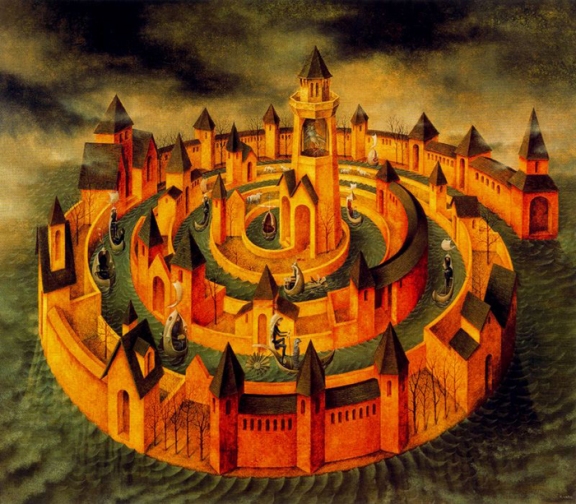by Brian C. Moore, Ph.D.

Recall Desmond’s invocation of a primal reality that precedes our striving efforts. The passio essendi is given at once, but within that giving, there are two aspects that may be distinguished. There is the immensity of the soul and there is, borrowing from Theresa of Avila, what one might call the secret of the interior castle. Begin with the soul. There have been interesting studies done upon the Hebrew words for soul (Jean Borella is worth a glance), as well as attempts to delineate Greek thinking on the subject. There is a debate upon whether the idea of an immortal soul is Greek or biblical. There are many such things that could be of interest. Whether one believes in the soul or not, it remains an indicator of what is precious about us and also of what escapes conceptual capture. Here, I will only remark that despite the use of rather famous analogies such as the charioteer who must manage a pair of mismatched horses, one wild, one noble, Plato’s most wise teaching on the soul is revealed through misdirection.
In The Republic, Socrates allows his youthful interlocuters to spend the night attempting to build the ideal city in words by seeking to find the blueprint in the structure of the soul. He assents readily enough to various provisional sketches, though all these easy victories are rather facetious. This is a work which begins with a putative exiling of the poets from the ideal polis, but ends with a mythic vision of justice in the afterlife. What Plato suggests is that the soul cannot be approached through attempts to pin it down to determinate categories. Rather, it requires metaphor and image to gropingly approach what is inherently beyond univocal fixation and summary comprehension. Socrates implies that the soul evades our attempts to master it through logic and definition. (This argument is made better and more fully in Jacob Howland’s The Republic: The Odyssey of Philosophy.)
There is a degree to which this is relatively uncontroversial. One need not concur with particular interpretations Freud and Jung gave to their empirical observations to recognize that they had rediscovered a depth dimension obscured by Enlightenment rationalism. Freud himself remained trapped in the most conventional nineteenth century materialism. Modern people are apt to acknowledge the subconscious, but then to interpret it as nothing more than a product of chemicals, of hormonal balances or imbalances, i.e., to reduce a complex reality to correlative physical states. For example, a study was done in which scans showed certain areas of the brain were activated when a person experienced a mystical episode. It was suggested, with a bit of condescending generosity, that believers in God were not so much crazy (one could legitimately have such episodes) as subject to a category error. They mistook a brain state for a divine being. It could happen to anyone, really. Well, there is certainly a category error. This is still a story told by Taylor’s buffered self. In a therapeutic age, people are happy to discuss the soul as a means to psychological well-feeling, even as a way to throw a swash of spiritual veneer over our efforts at building community out of an autonomy that eschews metaphysical relations as fictive pretexts aimed at limiting individual liberty. Alternatively, the collective mentality will resist the uniqueness of the soul, but occasionally invoke it as a rhetorical acid to expose the vapid materialism of bourgeois pretensions.
Yet in all this, the anxiety for control elicits blindness. In sleep, a little death, comes the opportunity for release and child-like trust. This is one of the messages of George MacDonald’s Lilith. In dreaming, the suppressed energies of the soul play in the fields of Morpheus. The rationalist will attempt to set clear warning signs of the danger. A dream may be an undigested bit of beef, a fragment of underdone potato, but it cannot be an eruption from metaphysical depths with cognitive value beyond perhaps a rough connection to the preoccupations of one’s surface consciousness. The world of dreams, however, is elementally powerful; not simply a weather of psychic realities, but an entire universe of logos bearing images that counteracts the petty machinations of ideology, as well as the tendency to sclerosis in the empirical ego.

Discernment is needed. There is a hieratic order of dreams. Pavel Florensky distinguished between ordinary psychic mishmash (dreams of night) and those which came from higher dimensions, the oneric semiotic of dawn. These high dreams bring revelation of deep reality.
Nothing is more real or more objective than dreams. But there are many narrow-minded people who admit only Zola’s brand of reality. How dumb the world is, so dumb it makes you cry, but … never forget it can be saved by infinite Mercy. (Georges Bernanos, quoted in Hans Urs von Balthasar, Bernanos, p. 125)
Perhaps a human being is far more exotic than the shrewd little domesticated animal full of spite and a need to pass on a genetic trace that Darwin has left us to imagine. “Man is the key to the mystery of knowledge and existence. He is the enigmatic being which, though a part of nature, cannot be explained in terms of nature and through which alone it is possible to penetrate into the heart of being” (Nicholae Berdyaev, The Destiny of Man, p. 11). Anyway, I would tie this to wonder and to childhood. I assert that the most ordinary, boring slob is a façade for an overwhelming nature full of thunder and galaxies, however occluded. I bring back R. A. Lafferty’s Epikt, a philosophical computer who sees:
I found something which I did not quite understand; something which I can only call “balloons.” What were they? … All the children trailed a multitude of varicolored balloons as if on invisible strings about them. I have reason to believe that the balloons also are invisible to human eyes … It seemed at first that each of these child balloons represented a previous life on some other plain. I am violently opposed to the idea of reincarnation, as would be any intelligent machine that had assimilated all the literature on the subject; yet these were more than typical idea-balloons. I know, of course, that all children are born Platonists (full of innate forms and ideas), and do not become Aristotelians until they have reached the age of reason. And there was something of these Platonic forms and types in the balloons, but there was much else. Adolescents and adults have futures: small children have only pasts, which they will slough off all too soon. They have memory, even the most grubby of them, of things that are not entirely grubby, not entirely of this world. … every balloon of every child (and some children have dozens) is a world remembered. (I use the word “world” loosely; I use the word “remembered” loosely.) (Arrive at Easterwine)
There are depths to the soul compared to which the Grand Canyon is but the meanest ditch. Our surface, finite ego is limited, and false if treated as definitive. Mystics from every tradition have some experience of this mystery. The Buddhist koan is a riddling attempt to express this inexpressible reality. Though, seemingly, many people never have this experience. Or if it is more common, it is lost due to distraction, inattentiveness, and the lack of a wisdom tradition that would give some guidance upon how to interpret it and how to proceed. More often than not, the individual feels trapped, restless, bored. Now the buffered self is a prison. Rather than infinite depths, the individual is repetitive, dull, annoying; more generously, affable, perhaps lovable, but after a while, long or short, predictable. The language of infinity seems ill-suited. Life itself becomes a monotonous string of bad infinity, one damn thing after another. One even becomes tired of oneself, humiliated by weakness, failure, a loneliness that can be exacerbated by social bonds that are incapable of assuaging an enigmatic wound. It is easy to become misanthropic, disgusted with the vulgar banality and vicious cruelty of the human race.



Brian, where’s the Bernanos quote from?
LikeLike
Well, Tom, I wish I knew.
I wrote it out on an index card some years ago and failed to put the source.
It’s likely I got it from Hans Urs von Balthasar’s book on Bernanos which has a lot of translated material that is otherwise hard to find.
LikeLike
Indeed, from Bernanos: an ecclesial existence, p. 125 (Igantius Press, San Francisco 1996). It’s from a letter to Jorge de Lima.
LikeLiked by 1 person
Father, could you add in the citation information Jonathan has so kindly provided?
LikeLike
Thanks, Jonathan. You are responsible for Lafferty showing up in all this.
Thanks for that, too.
LikeLike
[*cracks knuckles, leans back with air of vast self-satisfaction*] That’s why they pay me the big bucks. . .
Or not. Actually, I happen to have the Balthasar book sitting on my desk (still largely unread, I’m afraid). And, as they say, Google Is Your Friend. (Except when it’s evil.)
You’re welcome to the Lafferty. You seem to have gotten more mileage out of him than anyone else I’ve recommended him to. These posts are making me want to read Lafferty again. Unfortunately (for me anyway), I made a gift of my copies of his books to my brother several years ago, and as you know they’re hard to come by. I’ve actually tried to nudge some people about a quality re-issue, but apparently the rights situation is a mess. Or so I’m told. Also, publishers are idiots.
Some of these posts of yours are really helping me to think through some of the basic problems I have with the doctrine my faith impels me to believe. I much prefer meditation to argument. So the gratitude goes both ways, I assure you.
LikeLike
Oh, I hope your brother appreciates that.
Argument and debate is really pretty limited.
Meditation and art reaches much further.
We’re often on the same page. I am glad you’re finding some of this helpful.
LikeLike
Jonathan, do you have page number for the quote?
LikeLike
Father, I think it’s p. 125. Just in front of the parenthetical publishing info.
I have the book at home. I just can’t find it. Too many books, not enough house.
LikeLike
Yes, 125. Sorry, my reference wasn’t exactly in Chicago Manual of Style.
LikeLike
Balthasar’s note: “To Jorge de Lima, November 15, 1943; Lettres inédites, 57.” The English translator is Erasmo Leiva-Merikakis. I’m not sure whether Balthasar would have quoted in French or translated it into his own German. But in either case, I assume our translator would have gone to the original French.
Here’s the entire quotation that Balthasar gives:
I write you today to thank you for your fine article on Monsieur Ouine. You put it in a marvelous category: that of oniric, or dream, literature. I would be so pleased if the first random critic didn’t term it “surrealist.” Nothing is more real or more objective than dreams. But there are many narrow-minded people who admit only Zola’s brand of reality. How dumb the world is, so dumb it makes you cry, but you never forget it can be saved by infinite Mercy. Why can’t they understand how logical things can become oniric, and logically, for instance in hypnosis and in novels? This is because nothing is as lucid as a dream. And is there anything more conscious than the intoxication of art? Ah, my dear Jorge! Life is full of imagination, and from it come the good images, like those of a luminous intelligence such as yours. From here I send you the warm greetings of an awakened sleeper.
LikeLike